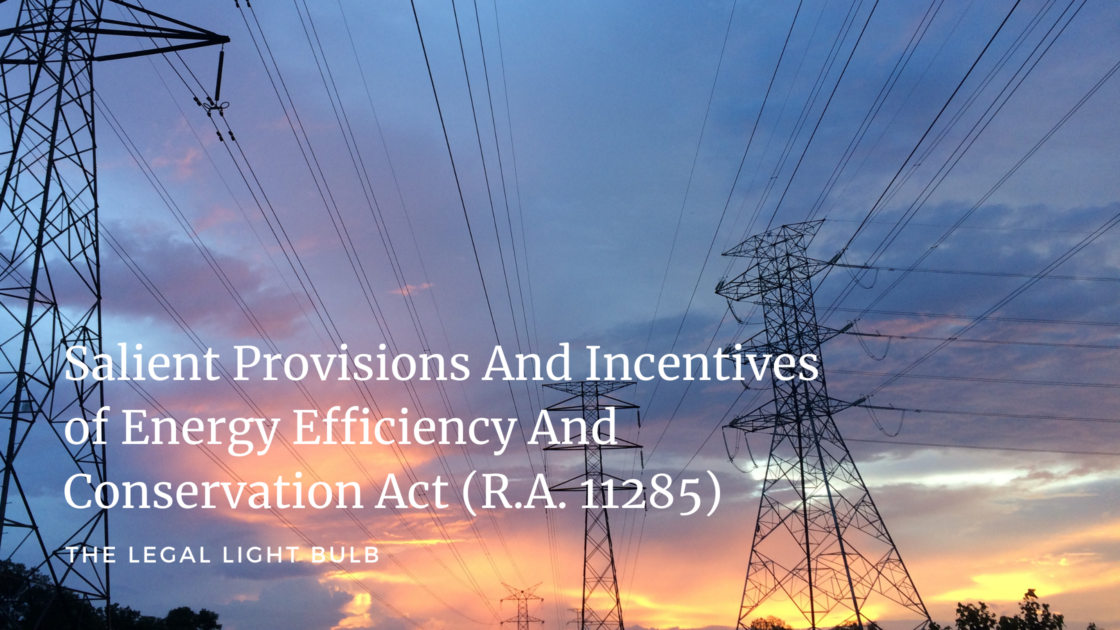Energy Efficiency And Conservation Act
On April 12, 2019, President Rodrigo Duterte signed into law Republic Act (RA) 11285 entitled – Energy Efficiency And Conservation Act
An Act Institutionalizing Energy Efficiency and Conservation, Enhancing the Efficient Use of Energy, Granting Incentives to Energy Efficiency and Conservation Projects”. The law seeks to “… establish a framework for introducing and institutionalizing fundamental policies on energy efficiency and conservation, including the promotion of efficient and judicious utilization of energy, increase in the utilization of energy efficiency and renewable energy technologies, and the delineation of responsibilities among various government agencies and private entities
RA 11285 Section 3
Basically, RA 11285 institutionalizes energy conservation and makes it mandatory to ensure that energy consumption becomes sustainable. The promotion of renewable energy is also provided under this law.
Energy Efficiency And Conservation Act Salient Provisions:
Roles and Responsibilities of Different Government Agencies
Department of Energy
a. The Department of Energy (DOE) will develop, impose, and review the MEP in consultation with the Department of Trade and Industry – Bureau of Philippine Standards (Section 5[e])
What is MEP?
Minimum Energy Performance (MEP) refers to a performance standard that prescribes a minimum level of energy performance for the commercial, industrial, and transport sectors, and energy-consuming products including appliances, lighting, electrical equipment, machinery, and transport vehicles that must be met or exceeded before they can be offered for sale or used for residential, commercial, transport, and industrial purposes (Section 4[w])
b. Require manufacturers, importers, and dealers to comply with the MEP, and to display on the packaging and on their products the energy label showing the energy requirement and consumption efficiency of such products. (Section 5[f])
c. Enforce and ensure compliance with prescribed rating standards for energy performance in buildings and industries, in coordination with pertinent government agencies and LGUs (Section 5[f])
Department of Public Works and Highways (DPWH)
Department of Public Works and Highways (DPWH) – The DPWH shall, in coordination with the DOE, be responsible for ensuring the implementation of the Guidelines on Energy Conserving Design of Buildings and Utility Systems as an integral part of the National Building Code, Roadway Lighting Guidelines, and such other related guidelines as may be issued by the DOE, and in accordance with Republic Act No. 6541, otherwise known as the “National Building Code of the Philippines” and other related laws (Section 6[j])
Department of Trade and Industry
Department of Trade and Industry (DTI) – The DTI, through the Bureau of Philippine Standards, shall, in consultation with the DOE, require manufacturers, importers, and dealers to comply with the MEP, and to display the energy label and the energy efficiency label showing the energy requirement and consumption efficiency of such products on the packaging and on the products themselves (Section 6[l])
Department of Transportation (DOTr)
The DOTr shall, in coordination with the DOE and the DENR, be responsible for ensuring compliance of vehicle owners, manufacturers, and importers with the MEP for transport vehicles consistent with the specifications for all types of fuels prescribed under Republic Act No. 8749, otherwise known as the “Philippine Clean Air Act of 1999”, and to display the energy consumption label in coordination with the vehicle manufacturers, transport industry associations, public transport groups, and non-government organizations. The DOTr shall also assist the DOE in the enforcement of and compliance with measures under this Act and its IRR relative to the energy consumption of the transport sector (Section 6[m])
What are the responsibilities placed by RA 11285 to the private sector that they need to comply with?
- All manufacturers, importers, distributors, and retailers of energy-consuming products shall comply with the MEP, subject their energy-consuming products to energy performance testing, and submit their respective product information to the DOE. (Section 14)
- No manufacturer, importer, distributor, and retailer shall sell, lease, or import any energy-consuming product, unless the product complies with the MEP and the product or its package is labeled in accordance with this Act. • To ensure fuel efficiency for transport, vehicle manufacturers, importers, and dealers shall comply with fuel economy7 performance labeling requirements set by the DOE with the assistance of the DENR and the DOTr. The vehicle manufacturers, importers, and dealers shall provide technical information on the fuel economy rating of the engine that, will allow the consumers to make an informed decision in choosing the vehicles for their use (Section 17) • To ensure energy performance for buildings, the local government units in the issuance of permits shall require New building constructions and retrofit of buildings comply with the minimum requirements as specified in the Guidelines on Energy Conserving Design on Buildings issued by the DOE (Section 18) What are Designated Establishments and their important obligations? Designated Establishments refers to a private or public entity in the commercial, industrial, transport, power, agriculture, public works, and other sectors identified by the Department of Energy (DOE) as energy-intensive industries based on their annual energy consumption in the previous year or an equivalent annual index; the amount of consumption is indicated in this Act and subject to adjustment by the DOE as it deems necessary (Section 4[c]) The above-mentioned Designated Establishments shall initially be classified as: a. First, Type 1 designated establishments are those with an annual energy consumption of 500,000 kilowatt-hours (kWh) to 4,000,000 kWh for the previous year; and b. Second, Type 2 designated establishments are those with an annual energy consumption of more than 4,000,000 kWh for the previous year. Important obligations of designated establishments
- Integrate an energy management system policy into the business operation based on ISO 50001 or any similar framework;
- Improve average specific energy consumption in accordance with the annual reduction targets to be established by the DOE in the NEECP;
- Employ a CECO for Type 1 designated establishments, and a CEM for Type 2 designated establishments: Provided, That the CECO and the CEM may be chosen from within the organization or hired through external recruitment
What is CECO?
a. Certified Energy Conservation Officer (CECO) refers to a professional who obtains a certification as a CECO after demonstrating high levels of experience, competence, proficiency, and ethical fitness in the energy management profession, and who shall be responsible for the supervision and maintenance of the facilities of Type 1 designated establishments for the proper management of energy consumption and such other functions deemed necessary for the efficient and judicious utilization of energy under this Act (Section 4[a])
WHAT ARE THE INCENTIVES FOR THE PRIVATE SECTOR IN COMPLYING WITH THE PROVISIONS OF RA 11285?
FISCAL INCENTIVES
Upon certification by the DOE, energy efficiency projects, as defined in this Act, shall be included in the annual investment priorities plan of the Board of Investments (BOI) and shall be entitled to the incentives provided under Executive Order No. 226, otherwise known as the “Omnibus Investments Code of 1987”, as amended, and any other applicable laws for ten (10) years from the effectivity of this Act: Provided, That after the aforementioned period, the inclusion of energy efficiency projects in the annual investment priorities plan shall be reviewed and may be extended by the BOI: Provided, further, That energy efficiency projects shall be exempt from Article 32(1) of Executive Order No. 226 (Section 25)
Basically, establishments that implement energy efficiency projects shall enjoy tax benefits/ holidays if they have been certified by the DOE.
NON-FISCAL INCENTIVES
Establishments that will implement or are implementing energy efficiency projects shall be entitled to the following:
a. Provision of awards and recognition for innovations in energy efficiency and conservation best practices, and successful energy efficiency projects and energy-efficient products; and
b. Provision of technical assistance from government agencies in the development and promotion of energy-efficient technologies. (Section 26)





